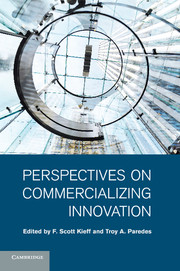Book contents
- Frontmatter
- Contents
- Contributors
- Dedication
- Acknowledgments
- Introduction
- Part I Perspectives on Theories of Intellectual Property
- Part II Perspectives on the Problems of Anticommons and Patent Thickets
- Part III Perspectives on Finance and Commercialization
- Part IV Perspectives on the University Innovation
- 13 University Software Ownership and Litigation
- 14 The Impact of the Bayh-Dole Act on Genetic Research and Development
- 15 Patents, Material Transfers, and Access to Research Inputs in Biomedical Research
- 16 Are Universities Patent Trolls?
- Part V Perspectives on International Considerations
- Index
- References
16 - Are Universities Patent Trolls?
from Part IV - Perspectives on the University Innovation
Published online by Cambridge University Press: 05 December 2011
- Frontmatter
- Contents
- Contributors
- Dedication
- Acknowledgments
- Introduction
- Part I Perspectives on Theories of Intellectual Property
- Part II Perspectives on the Problems of Anticommons and Patent Thickets
- Part III Perspectives on Finance and Commercialization
- Part IV Perspectives on the University Innovation
- 13 University Software Ownership and Litigation
- 14 The Impact of the Bayh-Dole Act on Genetic Research and Development
- 15 Patents, Material Transfers, and Access to Research Inputs in Biomedical Research
- 16 Are Universities Patent Trolls?
- Part V Perspectives on International Considerations
- Index
- References
Summary
Complaints about University Patents
The confluence of two significant developments in modern patent practice leads me to write a paper with such a provocative title.
The Rise of Patent Holdup
The first development is the rise of holdup as a primary component of patent litigation and patent licensing. You can call this the troll problem if you like. I prefer to think of it as the holdup problem. But whatever we call the problem, it seems quite clear that more and more patent litigation is being filed, and significant money is being made, by nonmanufacturing entities – entities that don't themselves actually make the product and in many cases don't actually engage in developing the technology very far at all. Many of these entities also engage in tactics that allow them to lay low and then take a mature industry by surprise once participants in the industry have made irreversible investments. The holdup or troll problem is particularly significant in component-driven industries, notably information technology (IT), where the problem is compounded by the fact that a product developer such as Intel that must aggregate thousands of different inventions into its semiconductor chip is vulnerable to holdup by any one of the thousands of inventors. Patent owners in those component industries can capture far more than the intrinsic value of their invention, because under long-standing patent law patent owners have the right not just to sue and get paid the percentage of the value contributed by their invention but to enjoin the sale of Intel's entire chip until it can design a new chip that avoids infringing that patent, something that might take years and require investing billions of dollars in a new fabrication plant. These factors have combined to produce the growth industry of the new millennium: patent holdup. Hundreds of companies are engaging in efforts to capture not just the value of what you contributed to as an invention, but a disproportionate share of somebody else's product.
- Type
- Chapter
- Information
- Perspectives on Commercializing Innovation , pp. 531 - 546Publisher: Cambridge University PressPrint publication year: 2011
References
- 1
- Cited by

